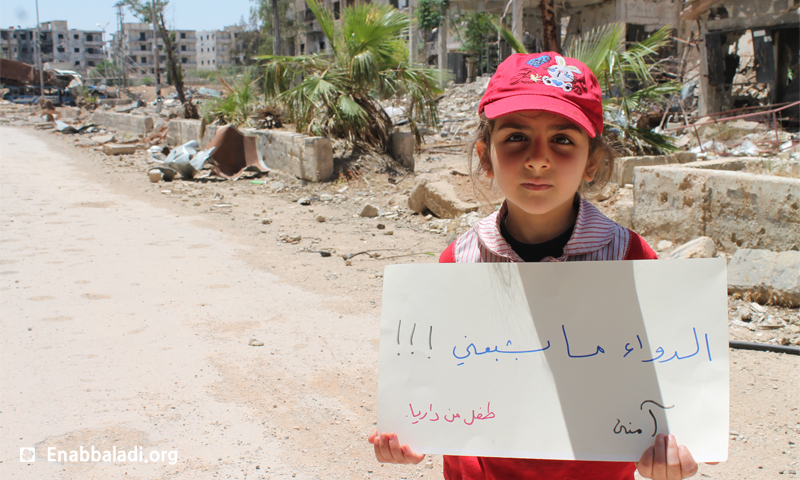Printed Edition ‖ No.: 221
Enab Baladi – Daraya
Not only did dozens of Daraya’s City residents wait for the entry of medicines, Thursday, May 12, but they stood up to protest against the behavior of the UN delegation and express their “indignation”, because the convoy did not contain any food-aid to alleviate their suffering. After waiting for about seven hours, they returned back empty handed after Assad’s forces banned the delegation from entering, leaving behind two victims (a father and his son), killed by Assad’s forces bombing the assembly site, along with five injuries.
Mr. Maher Abu Nazir, secretary of the local council, described what happened as “a new stain added to the stigma that exposes the international community as unjust and the United Nations’ inability to perform the simplest tasks.”
The secretary explained in an interview to Enab Baladi that “the International Red Cross Committee informed the field hospital on Wednesday, May 11th, its intention to bring in some medicinal aid to the besieged city, after obtaining the regime’s forces approval, excluding food aid, and only including drugs vaccines and infant formula.”
The convoy arrived, including members of the UN and the International Committee of the Red Cross (ICRC) and the Syrian Red Crescent, at about one o’clock Thursday afternoon, to the outskirts of the city to be stopped at a checkpoint by the Forka Alrabea (the fourth unit) near the factory “Ice Man” for inspection; the regime officers insisted to prevent the entry of baby formula and medicine allowing only vaccines.
But the team responsible for the convoy insisted on entering of full pharmaceutical aid, and the negotiations between the two parties continued for several hours with no result, which led to the cancellation of the entire mission and the return of the convoy to Damascus at 6:15 pm, without entering any aid.
During the delegation’s return, a “real massacre was about to happen to dozens of women and children who have gathered at the city’s entrance,” according to the director of local council media office, Karam AlShami, who explained, “After waiting for hours for the delegation to enter, rockets began falling on them instead of aid”, as he describes, adding “they returned carrying two martyrs; a father and his son, and five injuries.”
A state of “despair and oppression” swept the city after that day, according to Karam, asserting that “people have only received more pain after holding hopes for the entry of aid.”
Captain Saeed Nakerh (Abu-Jamal), brigade commander of Shohada Al-Islam (Islam Martyrs), described Assad’s regime as representing “gangs and mafias” on his Facebook page, adding “for months, the UN and the Red Cross were trying to get permission to enter Daraya City, and after the humanity-needs file went through all the security and Tashbeeh (intimidating by force and violence in service of the Syrian regime) branches, the regular and irregular forces, and the approval of the High Representatives of each of Russia, Iran and Hezbollah; the UN and the Red Cross Mission reached the last point, which is the regime, before entering Daraya, the international staff, who were carrying some medicines for chronic diseases, vaccines, milk for children and school supplies, were humiliated by the checkpoint for long hours, not to mention steeling the aid and preventing them from entering the city.”
Mohammed Abu Bara, a 34 years old city farmer, was wondering about the “feasibility of meetings and conventions that take place abroad,” as he put it, adding: “Is the international community so weak that they are incapable of bringing in some aid to the besieged city, or is everyone involved with the regime in the tragedy of Syrian people?”
The farmer adds “We stayed in our city and we have no regrets. We faced the unjust regime, and we still insist to do so. We ask no one for help except for the help of Allah.”
